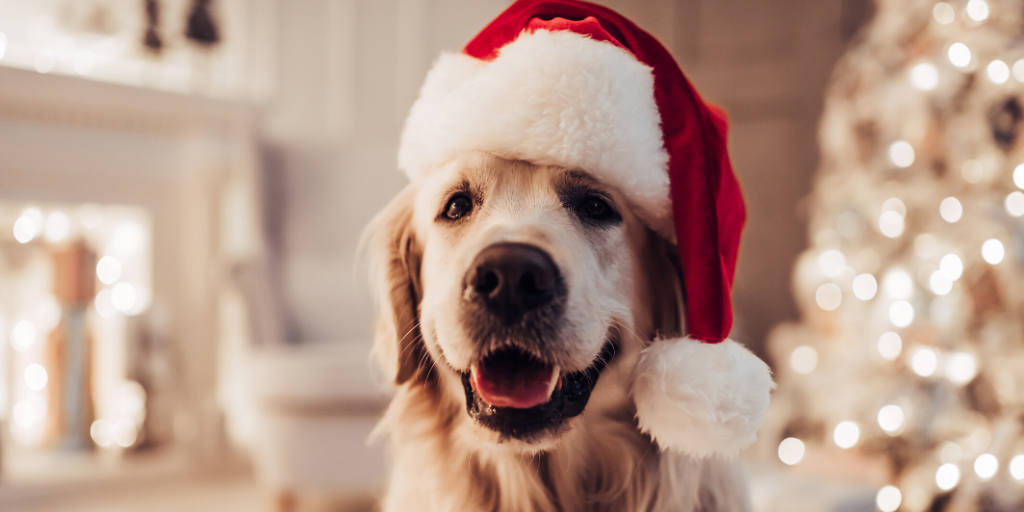'Tis the season for snow, Santa and mistletoe. The winter holidays are meant to be jolly, but that can change quickly if we don't keep our dogs safe during them. Here's a Christmas safety guide for you and your pets:
Christmas Tree Precautions
- Anchor your tree - Make sure to securely anchor your Christmas tree so it won't fall and injure your pet. It's a good idea to check the stand daily to ensure it's always locked in place. For extra security, you can also anchor the tree to the ceiling.
- Keep the tree's water out of reach - Live Christmas trees have a water reservoir inside the tree stand. Make sure this is not accessible to pets, as it may contain dangerous substances. These include toxic sap from the tree, standing water bacteria, pesticides and fertilizer water additives (such as aspirin, which can be fatal in large amounts). Block access to the tree stand or thoroughly cover it with aluminum foil and a well-wrapped tree skirt.
-
Supervise around the tree - It's best to supervise your pets around the tree at all times. If that's not possible, keep your tree in a room you can close off or barricade, to keep your pet away when you're not home.
Dangerous Holiday Plants
- Mistletoe - Eating the leaves and berries of this iconic Christmas plant can cause your pet to experience gastrointestinal upset and cardiovascular problems, such as a slow heartbeat. This is because of the viscotoxins in the plant.
- Holly - Ingesting holly can cause nausea, vomiting and diarrhea in pets due to the toxic saponins. This is true for both English and Asian varieties of the plant.
- Poinsettia - These bright red flowers are mildly toxic to dogs, often causing diarrhea, vomiting and excessive drooling. When ingested in larger quantities, though, it can become more toxic.
- Lilies - Many Christmas bouquets have lilies but these beauties are very dangerous to pets. They can cause kidney failure, particularly in cats.
Many dogs will try to eat plants, much like when they eat grass outside. To be as safe as possible, don't include these Christmas plants and flowers in your home. Instead, opt for artificial plants made from silk or plastic (as long as you keep them out of your pet's reach), or choose a pet-safe bouquet.
Be Aware Of Decorations
- Christmas lights - All the lights and baubles for your Christmas tree are pretty, but they pose a risk to pets. They can be a choking hazard and cause internal injuries or intestinal blockage if successfully swallowed.
- Ornaments - Ornaments, too, can be harmful to pets. If chewed and swallowed, they can cut the mouth, throat and digestive system or cause intestinal blockage.
- Tinsel and garland - These decorations may sparkle but if swallowed, things won't look so bright. They can cause intestinal obstruction, severe vomiting and dehydration or even death.
- Wires and batteries - Keep wires and batteries away from your pets. If chewed or swallowed, these can cause electrical shock or electrocution, as well as burns to the mouth or esophagus.
-
Candles - If your pet gets to lighted candles, it can result in burns or injuries or cause a fire in the home. Use appropriate and study candle holders and make sure not to leave lit candles unattended. If you leave the room, put the candle out or barricade your pets away.
Although decorations can pose risks to pets, they are a huge part of Christmas and making the holiday festive. It's fine to use them as long as you are keeping your pets safe around them.
Making Gift Giving Safe
- Stockings - Make sure your stockings are out of reach of pets and don't contain any dangerous foods (such as chocolate and raisins) or small gifts that pose a choking hazard.
- Wrapping - Wrapping paper, ribbons and small gifts can be a choking hazard or cause intestinal blockage if swallowed by pets. Make sure to always keep an eye on your pets when opening presents or keep them in a separate room, if need be.
Holiday Food To Avoid
- Eggnog - Eggnog is full of fat, sugar, milk, raw eggs and alcohol, which means it's not safe for dogs to eat.
- Ham - Pork can cause pancreatitis in dogs, which can become life threatening if untreated.
- Fruit cake - Fruit cake is a traditional Christmas dessert but it contains ingredients that are dangerous to dogs. These include spices, nuts and dried fruit (like raisins) and sometimes even alcohol (which can cause weakness, respiratory issues, coma or even death if ingested)
- Nutmeg - In large amounts, this spice can be toxic to dogs, causing abdominal pain, hallucinations and even seizures.
- Garlic and onion - These vegetables are found in many holiday dishes but are toxic to dogs. They can damage red blood cells and cause anemia, among other issues.
- Sweets - Don't feed your pets sweets, especially anything with chocolate, raisins or the artificial sweetener xylitol. These ingredients are all toxic to dogs. In addition, ingesting sugar can cause upset stomach and diarrhea.
- Leftovers - Leftovers are likely full of fats and spices, which are not good for dogs. These can cause gastrointestinal upset and costly vet bills if medical attention is necessary.
Make sure to supervise your pets around food. It may be a good idea to keep them barricaded out of the kitchen when cooking. Don't leave any plates unattended and make sure garbage can lids are secure or trash is kept out of reach. In addition, make sure all guests understand that the food is for them, not the dogs. If you think your dog has swallowed anything he or she shouldn't have, contact a vet immediately or take them to the emergency vet.

